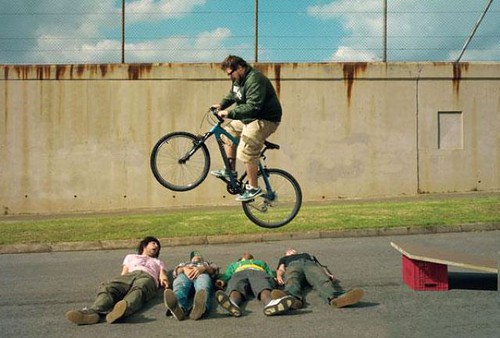Danger - the risk of injury or death - has important or even essential psychological effects for normal human development. If one does not experience and live through danger then they will never fully psychologically develop. To become a fully psychologically developed individual one has to survive dangerous situations at least at some point in ones life.
Why would this be so?
A good example of this is overseas travel especially for Australians as Australia is such a paternalistic place where the government and organizations like the AMA are constantly trying to make everything safe. As soon as a young person is hurt or killed it immediately sets about changing laws and any other thing it can think of to eradicate that danger or reduce it to its barest minimum.
The only way to get away from this is to travel overseas to other countries where governments are not so paternalistic. When that happens you have to learn to survive on your own. The young person is putting self into a more dangerous situation where they have to make observations of the environment, make correct decisions about how to act and then they survive. Of course because the danger is increased more of them will be hurt and occasionally some will die. This shows to all the others that they survived, they did make it on their own and they lived through a dangerous situation.
Unfortunately there is no way around it. Sooner or later the youngster has to fly from the nest. When they do some will fly and some will fall to the ground and die. What the Australian government would do is put a big soft mattress under the nest to protect all the ones that fell. As soon as you do that you take away the danger and flying out of the nest looses its psychological significance and benefits. In essence you haven’t really flown from the nest, at least psychologically anyway. All those that did fly no longer get the psychological benefits because they knew there was no danger in flying.
Hence we have one of the first psychological benefits of living through danger. It allows the youngster to psychologically separate and individuate as they say. They have seen themselves enter a dangerous situation (with out paternal protection), deal with the danger and survive. Thus showing them self that they can survive on their own hence the development of psychological separation and individuation from the parents. Along with this goes a increase in ones self esteem and a sense of achievement is experienced. Finally it also allows the youngster to develop skills in dealing with the world. If one never puts self in danger they are never going to develop the skills to deal with that danger.
At this point we can thus see three important psychological consequences of putting self in dangerous (potentially life threatening) situations.
1. Development of psychological separation and individuation
2. Increase in self esteem
3. Obtaining important life skills.
The reason why I have chosen the topic of overseas travel is because in recent times the press have been in a big flurry over a young Australia who dank contaminated alcohol in Indonesia and died. This is getting massive coverage in the press. Without a doubt a very tragic situation to have a young Australian die like that. An instance of one who flew from the nest but fell to the ground and died.
This is a quote of the first paragraph written in a newspaper article by Steve Pennells.
“The bar that allegedly served the drink that killed Perth teenager Liam Davies remained open yesterday as Indonesian police revealed that no investigation had been launched into his death.”
When I first read this I chuckled as it is such a culturally egocentric point of view. The Indonesian government have far larger social issues to deal with than this. If Australia was in the same position as Indonesian society we would not be investigating it either. There are far more important social issues to spend the scare resources on, than such an investigation.
Secondly it typifies the Australian solution to the problem - remove the danger. The solution of putting the mattress under the nest. Hence we are creating a generation who are not getting the essential psychological benefits that come from allowing young people to go into dangerous and potentially life threatening situations.
Graffiti



People can be educated and thus make informed choices about what they do and don't do. If laws constantly over protect people then how can they develop the all important characteristic of common sense. I wonder if there is an entire generation out there that thinks Australia is the safety bench mark for the world.
ReplyDeleteI think you make a good point Linda. Parents are left in such a bind. The last thing they want is for their child to be hurt but at the same time if they are never allowed to fall and hurt self they never learn about how to look after them selves. Tony
ReplyDelete